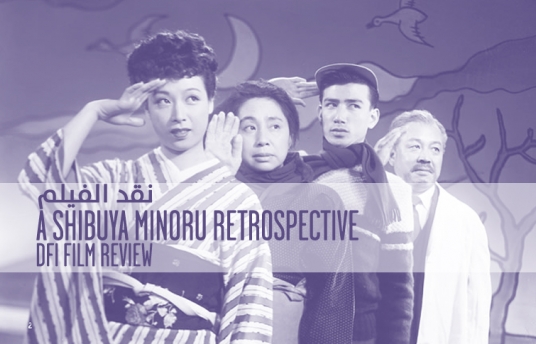DFI Film Review: A Shibuya Minoru Retrospective
Mar 15, 2011

Written by Patricia Donohue, Programming Operations, DFI
Film review: A Shibuya Minoru Retrospective
Only in film festivals can you get the rare opportunity to catch a glimpse into the prolific career of a visionary director. So instead of watching the latest films on the market at the Berlin Film Festival, I decided to kick it old school. This year Berlinale had a sort of retrospective on Japanese director, Shibuya Minoru. Virtually unknown outside of Japan, I thought “why not?”. I like black and white movies, his name is fun to say and knowing who Kurosawa is can only take me so far as a film snob.
Out of the eight films in the programme, I was able to watch three. As a director of over four dozen films, Minoru’s main focus was post-war life in Japan. He boldly explored themes of family, greed and morality in a world that struggled to rebuild itself. His characteristic sarcasm and willingness to recognize a flawed society allowed him to move easily from comedy to satire to drama. Although over the top at times, watching his films made you feel like you were being let in on a secret, like you were a tourist being taken to a local’s favourite rundown, hole-in-the-wall restaurant – the true centre of the city.
‘Doctor’s Day Off’, 1952
A black and white comedy about a doctor who seems to have more patients on his one day off a year than any other was the perfect way to start. Brilliantly acted, the doctor jumps from emergency to emergency, introducing an eclectic cast of characters from a crazy war veteran to an obsessive gambling father-to-be, to a young man in love with letter writing. What fascinated me most about this film was Minoru’s ability to make each person’s story, and even each moment, both heart-wrenching and hilarious. He treated heavy, depressing and seemingly controversial subjects with a kind of lightness, but without trivializing the gravity of the situations his characters found themselves in. There was a kind of polyphony to it that had you both laughing and crying during a pretty perfect final shot – a representation of the balance of this film’s perspectives.
‘Modern People’, 1952
A drama and one of Minoru’s most famous works, this film was a lot heavier, a lot longer and a lot more involved. An inherently good father leads a life of corruption, adultery and desperation as he struggles with a sick wife, a thankless job and a naive daughter he wants to protect from it all. Believing it impossible to escape, the father guiltily continues down a path without truly trying to change direction. A young, poor and ambitious new coworker begins to follow in his footsteps until he falls in love with the man’s daughter. Wanting to give the daughter her perfect family back, the young man decides to save her father by out-corrupting his corruption. Ending with the absolute worst possible scenario where every bad choice digs an even deeper hole, Minoru highlights a twisted logic that eats away at the people of his era. Not only is the road to hell really paved with good intentions, but redemption itself must end in self-sacrifice.
‘The Days of Evil Women’, 1958
Dysfunctional family meets greed meets silly fun in the last film of my Shibuya Minoru trilogy. A rich, old, stingy man’s mistress gets fed up that he hasn’t died and left her all his money years ago when she thought he would. With both subtlety and obvious female trickery, this former geisha enlists the help of an old customer to get rid of him. However, she’s not the only one on the murder wagon as her daughter, her husband’s nephew and an assassin plot alongside her. But no matter what they try, the tightfisted bazillionaire just won’t die. Hilarious attempt after hilarious attempt turns the story into a race to see who can get his fortune first. A really funny look at greed and the family dynamic, Minoru gives you a kind of lighthearted “No Exit” story where all the characters deserve what’s coming to them.